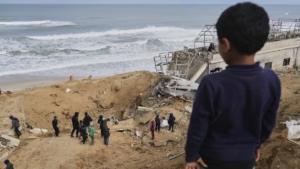In Panama City, at least three individuals from a group of about 300 migrants deported from the United States this month by the Trump administration were visibly unwell upon arrival from a detention camp located on the edge of a jungle. The deportees, hailing from countries such as Iran, Afghanistan, Cameroon, Ethiopia, and Uzbekistan, found themselves abandoned in a foreign country with no concrete plans or assistance.
These deportees were initially held in a hotel by Panamanian officials before being moved to a guarded camp at the edge of a jungle. After legal action and pressure from human rights groups, the Panamanian authorities released the migrants, busing them back to Panama City where they currently reside, mainly in a school gymnasium. Most of the migrants interviewed expressed uncertainty about their future, with many fearing for their safety and struggling with a lack of resources and support.
Washington’s decision to send migrants to Central America has raised legal questions and left the migrants stranded in countries where they have no support networks or long-term legal status. Furthermore, most of these migrants claimed they had informed US officials about their fear of returning to their home countries but were never formally offered the opportunity to request asylum.
As the migrants navigate this new and precarious reality, some are considering risky attempts to return to the United States, with some already seeking assistance from smugglers or exploring alternative destinations. Legal aid organizations and Christian charities are providing some support, but the prospects for these deportees remain uncertain.
This situation exposes the profound challenges faced by individuals affected by the Trump administration’s immigration policies, as well as the broader regional implications of such enforced relocations. The migrants’ stories underscore the harsh realities faced by those who seek refuge but find themselves caught in the midst of shifting national policies and varying international norms concerning immigration and asylum.
Source: https://www.nytimes.com/2025/03/23/world/americas/migrants-panama-trump-stranded.html





